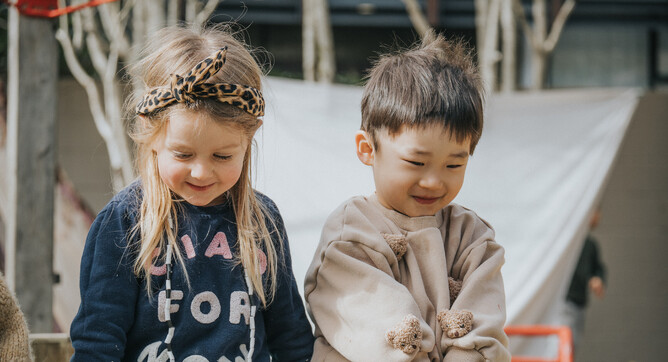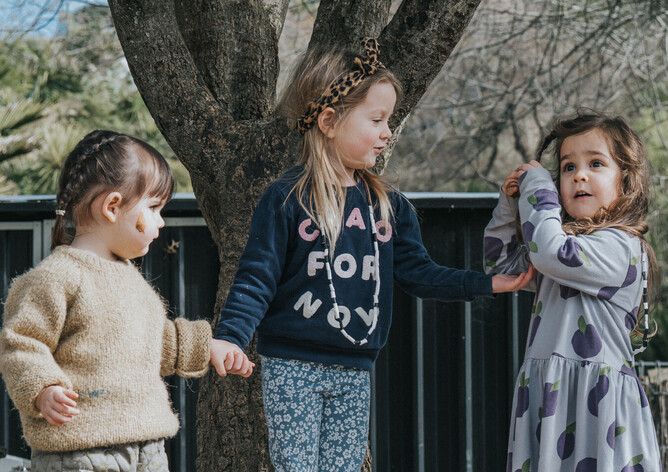Learning About Emotions and Apologising Naturally: Beyond 'Say Sorry’
While our children are young, we often find ourselves in situations where we reflexively prompt them to apologise. ‘Say sorry to your friend,’ we might insist after an incident. It’s instinctive because this is generally how we were brought up and what we think society expects of us as parents. But is this approach truly effective in teaching empathy and showing genuine remorse? At Oma Rāpeti, we believe there are more meaningful ways to help children understand and practice apologies, and to learn about their emotions along the way.
The Problem with Forced Apologies
When we require children to say ‘sorry’ after an incident, we can inadvertently teach them that a quick word can fix any problem. Imagine if we really could make every problem dissolve or repair itself with a single utterance. Unfortunately, there are no magic words in life - only our responses to situations and the actions we take to prevent similar events from occurring again.
A forced apology can also hinder children from processing their own emotions about a situation. Picture two children building with blocks and one child turns quickly, knocking the other child’s creation over in the process. Perhaps the child even deliberately pushed the other’s tower over.
These events can be upsetting to both children regardless of how the child may appear. The child who knocked over the tower could be feeling anything from shame, to anger, to confusion, to shock, or frustration. They might even be experiencing a little gleeful rush of adrenaline at the thrill of causing a tower of blocks to come crashing down. They might be curious about how their action caused a particular reaction in another child. The child whose tower fell down might be feeling upset, or annoyed, or maybe they’re not that bothered.
Whatever the feelings, an enforced ‘sorry’ here is not going to help either child process the genuine emotions that they are experiencing. Plus, young children need to learn how to label their emotions before they can practice processing their feelings in healthy ways. A quick, ‘sorry and you’re off,’ is going to stifle these crucial learning opportunities.
The Role of Brain Development
We know that children in this age group are in the (long!) process of developing their limbic systems which means their brains operate almost exclusively on emotion during this time. Our role as parents and teachers is to understand that young children are driven by their feelings and to support their emotional development by talking about feelings in age-appropriate ways. Check out our other blog on all things Brain Development!
What Can This Look Like?
We name the child’s emotions to support language development and understanding:
’You’re really happy/angry/frustrated/playful right now!’
We acknowledge how they feel to show that we see them and their feelings are valid:
‘You knocked over Peter’s tower and I can see you’re upset about that.’
We support the child through the emotion to help them learn how to regulate their feelings, and to give them opportunities to practice how to recognise and work through these feelings. When we’ve supported the child to feel calmer after an incident, we will talk about how to repair a situation: ‘Peter was angry when his tower fell down. Shall we offer to help him rebuild it? Or maybe we could go and see whether he wants help in the sandpit now, instead? What do you think could help him feel better?’
There are many ways young children can learn to rectify a situation and show that they feel sorry for what happened. Some children may want to offer a hug, or to give the other child something (a toy, a drawing, a cup of water…). We can encourage children to show their remorse in the many ways this might appear, so long as the other child is comfortable with it.
For example, if one child offers a hug but the other child says no, both children are now learning about setting and respecting personal boundaries. By not brushing off an incident with a forced apology, we’ve enabled the potential for growth.
Supporting Empathetic Development
So much of what children learn is through observation and, as parents, we are children’s most influential role models. Modelling empathy to children is one of the best ways to help them truly understand what it is.
When we acknowledge and label children’s feelings, we are being empathetic.
‘Are you okay? It can feel quite scary when you trip over…’.
‘You’re really sad that Dad has gone to work. It’s hard saying goodbye sometimes…’.
It can be tempting to try and distract a child from experiencing their emotions. We do this by telling an upset child that they’re actually okay (when, clearly, they are not), or by telling a child that they’ll be fine.
This is so easy to do. First, we were often told this as children ourselves. Second, being a parent and navigating your child’s emotions is hard and can be exhausting. There’s also an element of, ‘she’ll be right,’ which is classic Kiwi culture. But how does empathy fit in here?
As adults, when we are feeling upset about something, a bit of acknowledgement from another person truly helps. For a child, with minimal life experiences, who is currently lost in a sea of scary new feelings and uncertainty, a bit of empathy is a lifeboat.
We can also be an empathetic example to our children by modelling authentic apologies - being sincere to our child or others when we make mistakes, explaining why we're sorry, and talking about how we plan to make amends. If we want to see a behaviour in our children, we have to show them that behaviour first (while also remembering that mastering new skills takes time!).
The Long-Term Benefits
By being empathetic to children, and helping children understand their emotions and learn how to show when they feel sorry, we help them:
Develop authentic empathy
Understand the impact of their actions
Learn to take responsibility for their behaviour
Build stronger, more genuine relationships with others
See themselves as people who can make mistakes sometimes but also rectify them.
Learning to apologise sincerely is a process that takes time and patience. By guiding our children with respect and understanding, we can help them develop this important social skill in a meaningful way.
For our team at Oma Rāpeti, nurturing emotionally intelligent, empathetic individuals is a cornerstone of our philosophy. If you have any questions about our approach or would like to discuss this further, please don't hesitate to speak with our kaiako.



